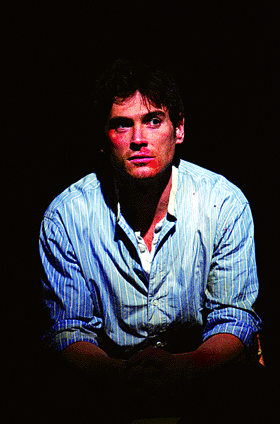Another brilliantly wicked Martin McDonagh play jumps the pond to Broadway
A fracas erupted after a recent performance of “Pillowman,” the latest effort by Britain’s Martin McDonagh, as dazed theatergoers slowly filed out of the Booth Theatre.
Apparently, two young women who had laughed heartily throughout the play, which details brutal child murders, were being scolded by their appalled neighbors. And the women weren’t having it.
These women were within their rights, actually. After all, the play is a comedy, albeit a very dark one, that manages to blur the line between humor and horror more thoroughly than any other in recent memory.
It’s from this discomfiting twilight zone that the work draws its edgy power—and its brilliance.
Directed seamlessly by John Crowley, “Pillowman” is a Pinter-esque account of Katurian (Billy Crudup), a reticent author who is taken into custody and grilled by deranged detectives Tupolski (Jeff Goldblum) and Ariel (Zeljko Ivanek) when actual murders in the area resemble those in his stories.
In the next room, Katurian’s stuttering, mentally stunted younger brother Michal (Michael Stuhlbarg) is also held as a suspect. Dressed in a moth-eaten maroon cardigan and suspenders, the pudgy, churlish Michal cuts a pathetic figure next to his handsome brother.
McDonagh has built a formidable career crafting plays with a sinister bent, winning scads of awards in New York and abroad. In 1997, at the tender age of 27, McDonagh had four plays running concurrently in the West End, a feat not achieved since Shakespeare. The following year, “The Beauty Queen of Leenane” won four Tony Awards and in 2004 “Pillowman” won the coveted Olivier Award in London for best new play.
Though his previous work features beheadings and such, in “Pillowman” McDonagh has outdone himself in the despicable acts department.
For these are not your everyday child murders, but tortuous atrocities of the grisliest order. Young innocents are drilled, maimed, crucified, buried alive—even forced to commit suicide. A couple of parents are snuffed out, too. Think “Grimm’s Fairy Tales” for the 21st century.
The investigators, who revel in cat-and-mouse antics with Katurian, have confiscated as evidence some 400 short stories, only one of them published, and many involving child abuse. Katurian insists they’re pure fantasy, and disparages authors who merely write about what they know because they’re “too stupid to make it up.”
Katurian’s claim of originality may not be entirely true, however. He recites a story of two brothers growing up in a house in the woods, where one is tortured for years at the hands of their parents and the other is showered with love and writes about the horrors he hears from the room next door. Could the story be based on his own childhood?
This tale, among others, is dramatized cartoonishly on a tiny stage that magically appears above the dingy interrogation room. One can only hope that the compensation package for the young actors portraying the abused children includes therapy sessions.
The flawless Crudup, best known for offbeat roles in films such as “Almost Famous” and “Stage Beauty,” imbues Katurian with a heroic dignity. His jittery hand movements and facial tics during the initial interrogation deftly give way to a bossy assurance when he’s alone with his needy brother.
Ivanek plays Ariel as a tightly wound maniac itching to wreak some torture of his own. With balding head and flared nostrils, he’s reminiscent of early John Malkovich, but even more menacing. Ironically, Ariel’s treatment of Katurian is nearly as cruel as the deeds described in the stories.
Tupolski, played by Goldblum at his finest, is an antagonistic bastard who deserves a good thrashing himself. He claims he’s playing good cop to Ariel’s bad cop, but it’s all relative. Incredibly, his snide description of Katurian’s writings as “101 ways to skewer a fucking five-year old” actually generates guffaws from the audience.
Unlike much of McDonagh’s other work, “Pillowman” does not take place in Ireland. In fact, the setting is vague, save for a reference to a “totalitarian state,” which explains why the brothers face instant death if found guilty. The stack of stories faces obliteration, too, which distresses Katurian even more.
McDonagh is clearly fascinated about the nature of storytelling itself. Katurian, whose plight mirrors the playwright’s own travails defending his violent stories, insists his work is for entertainment purposes only. “The first obligation of a storyteller is to tell a story,” he says. “I have no axe to grind.”
Of course, Tupolski and Ariel take issue with this, trying to decipher hidden messages to incriminate him. It doesn’t help Katurian that his day job is working in a slaughterhouse.
The play gets its title from a haunting tale about a creature made of pillows—perhaps a cousin of Freddie Krueger—who travels back in time to “rescue” children from a life of desolation by convincing them to kill themselves, making it look like an accident. Hence, tragedies like drowning, suffocation and being hit by a car are not really accidents at all. A supremely creepy notion, when you think about it.
Not every tale is grim, however. An early story, about a green pig who likes being different champions the virtues of individuality and offers a welcome glimmer of solace in the face of so much misery.
At play’s end, it’s unclear whether the story is just a story, a chilling parable harboring deeper truths or something in-between. But it’s not worth fretting over. Katurian, surely echoing McDonagh’s own conceit, sums it up best: “A story is a puzzle without a solution.”
gaycitynews.com



































